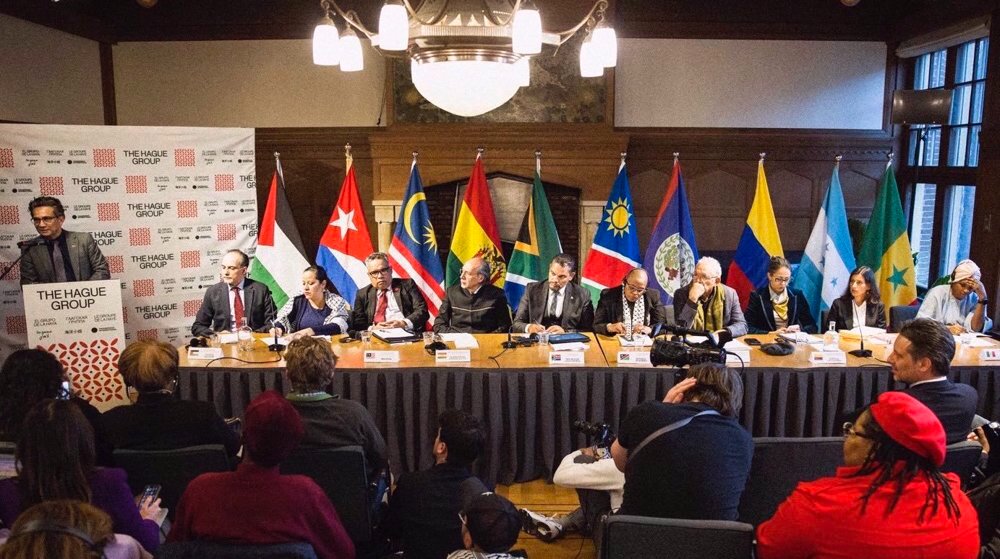Legal front opens in Global South to challenge Israeli impunity

TEHRAN - A decisive shift is underway regarding the international community’s posture toward the Gaza crisis. A coalition of countries is moving beyond rhetoric to impose targeted sanctions on Israel.
For months, global actors have continued to forge symbolic responses, ineffective ones, at a time when mounting evidence of systematic war crimes and genocide during the purported Israeli military operations in Gaza remains unchecked. Now, with an extraordinary six-point plan that includes arms embargoes and punishment through trade restrictions and international courts, this coalition seeks to break the long-standing cycle of impunity that keeps the relentless suffering in Gaza alive.
This historic development unfolded during an emergency summit of the Hague Group held on July 15 and 16, 2025, in Bogotá, Colombia. Representatives from over 30 countries—including China, Brazil, Turkey, and Qatar—gathered to coordinate concrete legal and diplomatic measures against Israel’s actions in Gaza, which has seen more than 58,000 Palestinians killed since late 2023.
The Hague Group's Bogotá conference, which resulted from Colombian and South African action some months prior to the conference, concluded with representatives from 12 countries taking a formal step to implement their six-point sanctions and accountability plan, which they term genocide and serious breaches of international law.
The committed countries and their measures
The countries directly committing to this plan are Bolivia, Colombia, Cuba, Indonesia, Iraq, Libya, Malaysia, Namibia, Nicaragua, Oman, Saint Vincent and the Grenadines, and South Africa. Their coordinated measures include banning the transfer or provision of arms, military fuel, equipment, and dual-use items to Israel, preventing Israeli ships from docking or transiting in their ports, and prohibiting vessels flying their flags from carrying military supplies to Israel.
They also pledged to review public contracts to prevent state funds from supporting companies involved in Israel’s occupation and to pursue rigorous legal investigations of war crimes, backing the exercise of universal jurisdiction that allows prosecution of international crimes regardless of location or nationality.
Breaking the cycle of impunity
These measures represent a bold departure from the inaction or selective diplomacy that have characterized much of the international response until now. As UN Special Rapporteur Francesca Albanese stated at the summit, “The clock is now ticking for states—from Europe to the Arab world and beyond—to join these efforts.”
Colombian President Gustavo Petro declared the event a historic pivot, emphasizing that no state should be “above the law” and condemning the disposability of Palestinian lives under the current status quo. South African Minister of International Relations Ronald Lamola also affirmed that the Hague Group was formed to “advance international law in an era of impunity,” highlighting the seriousness and feasibility of coordinated state action.
The timing of these decisions is crucial. Despite global outrage, Israel’s blockade, and its relentless bombardments and ground operations in Gaza, destroying civilian infrastructure and causing a humanitarian collapse, UN officials have called it genocidal. The major Western states, namely the U.S. and many European nations, actively provide military supplies or block accountability measures, tacitly enabling these violations to continue.
The sanctions by these 12 states, and the potential for others to join in within a deadline of September 2025, represent a significant rupture in international consensus led by the Global South and opposing established geopolitical alliances that have historically placed Israeli action above reproach.
Disrupting military support and enforcing international law
The Hague Group is disrupting Israel's ability to wage war unencumbered by terminating military supply chains and utilizing legal tools through its six-point plan. Together, the embargoes, restrictions on port access, reviews, and potential cancellations of public contracts, and ongoing attempts to prosecute Israeli leaders, pursued by arrest warrants requested from the International Criminal Court, undermine the operational and political bases of Israel's Gaza operations.
If that can be implemented, and then perhaps expanded to further demonstrate the new role for the international community, the once passive role of the international community could turn into a new role in making sure that the rights of Palestinians and their access to justice are enforced in some manner.
As the world watches this new chapter unfold, the imperative is clear: only sustained, enforceable international pressure grounded in law can end the impunity that has perpetuated Gaza’s suffering for decades.
